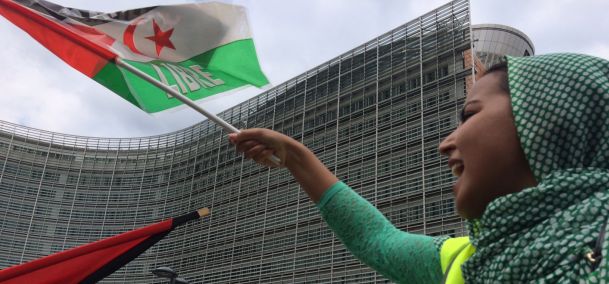
“This is a momentous victory for the people of Western Sahara. At a time when international law is under pressure, it is fundamental that the EU follows its own court and stops collaborating with the occupier through illegal trade agreements”, stated Western Sahara Resource Watch. This morning, the EU Court of Justice issued a landmark ruling.
In its rulings read out this morning, 4 October 2024, the EU Court of Justice (CJEU) has concluded that the EU appeals were all rejected.
Find press release from the Court regarding the fisheries and trade agreements. The text of the ruling on the trade agreement can be found here. The ruling on the fisheries agreement ruling is accessible here.
The President of the EU Court of Justice, Koen Lenaerts, clarified that EU-Morocco trade and fisheries agreements involving the territory are to be ceased within one year.
The Court had already nullified the application to Western Sahara of both the EU-Morocco trade and fisheries agreement, in 2016 and 2018, respectively. The Court then argued that Western Sahara is a “separate and distinct” territory over which Morocco has no sovereignty or administering mandate. As such, the EU’s deals with Morocco can only affect the territory with the explicit consent of the people of Western Sahara, as per their right to self-determination.
Rather than seeking that consent - and in disrespect of these rulings - the EU institutions negotiated with Morocco an amendment extending the geographical scope of the deals explicitly to Western Sahara. A subsequent consultation of exclusively Moroccan stakeholders was used to obfuscate the opposition of the Saharawi people - who saw no other option than to seek legal redress. In September 2021, the Court’s first chamber again pronounced in favour of the Saharawi people. Today, the Court of Justice rejected the appeal that had been instigated by the EU Council and Commission in December 2021.
“The ruling marks a momentous victory for the people of Western Sahara. It is now time for the EU to respect the rulings of its own court: Western Sahara is not Morocco and cannot be included in the EU’s dealings with the occupier”, Sara Eyckmans of Western Sahara Resource Watch stated.
“We call on all private companies that take part in Morocco’s plunder of the territory’s resources to respect rule of law and immediately end their involvement in the last colony in Africa. The foreign companies that work for Morocco in Western Sahara need to be really aware of the legal grey zone they are operating in”, she said.
The rulings come after a time of serious tensions between the EU and Morocco following the so-called ‘Moroccogate’ corruption scandal that shook the EU Parliament to its core.
So far, there have been seven rulings by the EU Courts on the approach of applying EU-Morocco agreements to Western Sahara.Find a comprehensive, interactive timeline that outlines developments that have lead to the current rulings here.
- In 2015, the General Court of the EU annulled the application of the EU-Morocco Trade deal in Western Sahara (T-512/12).
- In 2016, the EU Court of Justice ruled in the appeal initiated by the EU Commission on the 2015 ruling, concluding that the EU-Morocco Trade Agreement could not be applied to Western Sahara (C‑104/16 P).
- In February 2018, the EU Court of Justice ruled the EU-Morocco Fisheries Agreement to be inapplicable to Western Sahara in a case forwarded by the UK High Court (C-266/16).
- In July 2018, the EU General Court again concluded the EU-Morocco Fisheries Agreement to be invalid in Western Sahara in the case that Polisario had brought against the deal (T-180/14).
- In November 2018, the General Court of the EU rules the EU-Morocco Aviation Agreement as non-applicable to Western Sahara (T‑275/18). (Note: the EU Commission stated it would not appeal this ruling)
- In September 2021, the EU General Court issued rulings on the amended EU-Morocco Trade Agreement (T-279/19) and Fisheries Agreement (T-344/19 and T-356/19 combined).
All these rulings conclude that Western Sahara is a territory that is separate and distinct from Morocco, and that Morocco has no sovereignty or administering mandate for the territory. As such, the people of Western Sahara are a third party to the EU-Morocco agreements and should expressly consent to being affected by such agreements.
The September 2021 ruling added that consent is to be obtained through the UN-recognised representation of the people of Western Sahara, the Polisario Front. That clarification came in response to the EU Commission's approach to the Court's previous rulings on the trade and the fisheries agreement. The Commission then proceeded to hold negotiations with Morocco with a view of amending both agreements to include the words “Western Sahara” in their geographical scope of application. Rather than seeking the consent of the people of Western Sahara, as stipulated by the Court, the Commission set up a consultation of Moroccan stakeholders. Read all about that remarkably shocking approach in the report “Above the Law”, published by WSRW in December 2020.
The Court also ruled on the matter of labelling of Western Sahara produce, stating that agricultural products cannot be labelled as from Morocco.
Download the video above (31 Mb).
Since you're here....
WSRW’s work is being read and used more than ever. We work totally independently and to a large extent voluntarily. Our work takes time, dedication and diligence. But we do it because we believe it matters – and we hope you do too. We look for more monthly donors to support our work. If you'd like to contribute to our work – 3€, 5€, 8€ monthly… what you can spare – the future of WSRW would be much more secure. You can set up a monthly donation to WSRW quickly here.
EU elections: how have candidates voted on occupied Western Sahara?
Are you casting your vote for the EU elections? Find here a complete overview of MEP candidates who have supported the Moroccan occupation of Western Sahara in previous controversial votes. Choose wisely.
UK High Court confirms EU Court rulings on Western Sahara
The UK Court has concluded that the UK government has acted unlawfully in granting preferential tariff treatment to products from Western Sahara through a deal with Morocco, and in granting fisheries quota's for fishing in Western Sahara under a fish deal with Morocco.
EU Court reaffirms position on Western Sahara
Polisario has a case, but it should be pursued when the time is right, Court implies.
Saharawi groups object to EU's Western Sahara trade plans
No less than 93 Saharawi groups have called on the EU institutions to respect the will of the people of Western Sahara when negotiating trade or fisheries agreements that will affect their occupied land.


